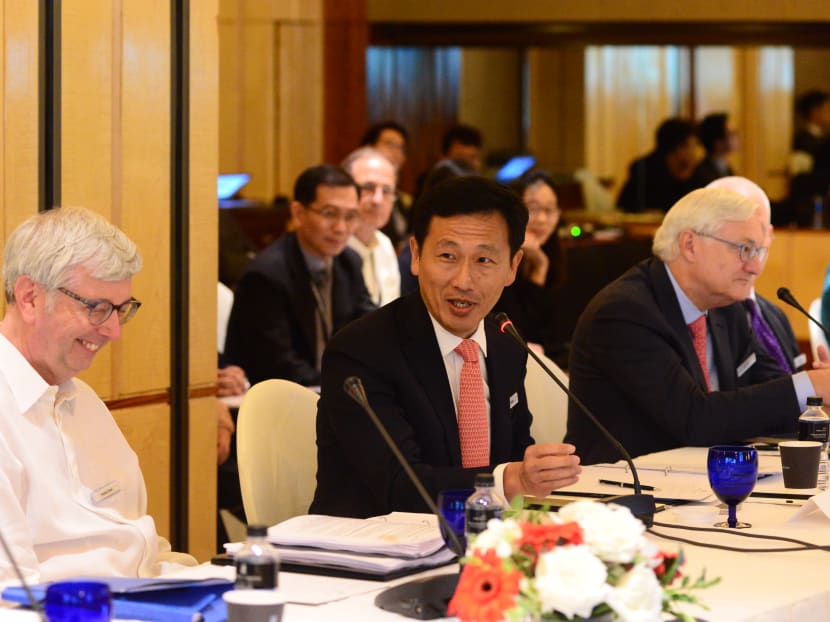Global ranking systems barely reflect universities’ individual strengths: Expert panel
SINGAPORE — Even as Singapore’s universities turn in sterling results in international rankings, Education Minister Ong Ye Kung suggested on Friday (June 29) that their individual performances could instead be measured using “different kinds of metrics” to better gauge their success and achievements.

Education Minister Ong Ye Kung (centre) speaking at the IAAP meeting with Prof Stephen Toope (left) and Mr Peter Voser.
SINGAPORE — Even as Singapore’s universities turn in sterling results in international rankings, Education Minister Ong Ye Kung suggested on Friday (June 29) that their individual performances could instead be measured using “different kinds of metrics” to better gauge their success and achievements.
Mr Ong was speaking to reporters at the Ritz-Carlton hotel, after a three-day meeting of the Ministry of Education’s International Academic Advisory Panel (IAAP).
The IAAP, chaired by Deputy Prime Minister Tharman Shanmugaratnam, meets once every few years to advise local universities and the ministry on education and research trends.
Now in its 11th edition, the panel comprises 11 other international academic and industry leaders. The heads of Singapore’s six autonomous universities also participated in the discussions.
On Friday, Mr Ong said the universities would benefit from a “much more variegated approach” in assessing how well they do, given that every institution has a different focus and distinctive objective.
“There is strong consensus around the table, and among all the education leaders in the world, that the current ranking system is actually rather crude and one-size-fits-all, and not that relevant compared to what we want to achieve,” he added.
At the minimum, Mr Ong said, a new metric should reflect three major focus areas: The value of a degree education, lifelong learning, and impactful research.
“I think we need a much more holistic view of a very complex function that universities now perform. You can’t boil it down to just one ranking and one rank,” he noted.
Singapore Management University provost Lily Kong, who will take over the university’s reins at the start of next year, added: “What we need are ways of assessing the outcomes and deliverables of universities that are fit for purpose, fit for the mission of each university, instead of assuming that all universities are trying to achieve the same thing and therefore can be measured against the same yardsticks.”
One of the panel members, University of Cambridge vice-chancellor Stephen Toope, further pointed out that students should think about the specific programme offered by the universities they want to enter, rather than their rankings.
“It's especially important here in Singapore. It's a small country with only a limited number of universities… Rankings tend to pull everyone back to a mean and make it seem as if there’s only one model of university that’s right,” Professor Toope added.
Mr Ong said the panel felt that Singapore could be a leader in lifelong learning and develop policies that other countries could refer to. They also recommended that Singapore take the lead in developing a framework for assessing the quality of lifelong learning courses.
However, there is still a need to figure out how best to execute and implement this, especially on how to strengthen support for adult learners, Mr Ong said.
“It won’t be very straightforward, as the needs of students and adults are different… that is something all our universities have to work through,” he added.
Added Prof Kong: “We're still… working through the different pedagogies that are needed for different types of learners — the experienced worker versus the fresh-faced undergraduate.”
Having invested in research, universities here also need to do a lot more to translate that investment into jobs, enterprises, and economic growth, Mr Ong noted.
Prof Kong revealed that SMU is working over the next few years towards issuing students a “parallel transcript” — alongside the traditional academic transcript — which would tell employees, for example, what kind of problem-solving skills they have learnt during university.
“How do we assess outcomes? How do we know that an education is well-delivered and well-received?” she added.
“One of the things that I think everyone agreed on was that learning in university is much more than the academic learning — it’s about things like learning how to communicate, working interculturally.”








